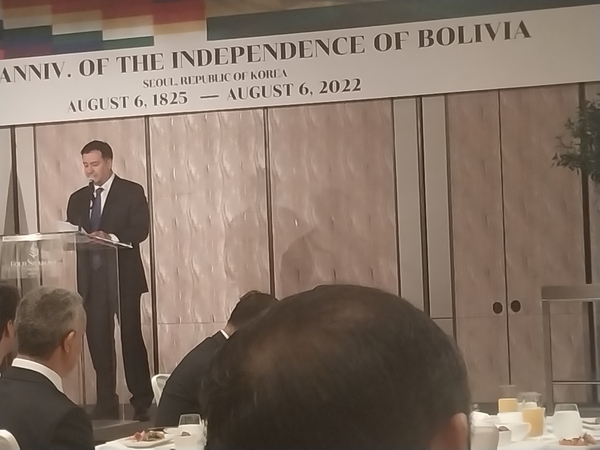
South American country asks cooperation with South Korea on natural resources
Charge d’Affaires a.i Mr. Luis Pablo Ossio Bustillos from Embassy of Bolivia has celebrated the country’s 197th anniversary of independence, which falls on Aug. 6, in an event in downtown Seoul.
The diplomat focused on promoting Bolivia’s industrial edges, including its large reserve of lithium, which is indispensable for such businesses as electric vehicles.
Bolivia has 21 million tonnes out of the 89 million tonnes that make up the world’s known lithium resources, according to the U.S. Geological Survey.
“Over 50 percent of the world’s identified lithium reserves are in three South American countries, Chile, Argentina, and Bolivia. Of these, Bolivia has the most amount of lithium reserves in the world,” he said.
“However, its lithium production has not reached commercial viability. Lithium to Bolivia is regarded as a great asset for the country to become more globally competitive and bolster its economy.”
This should hold great significance to South Korea, the home of three global lithium-ion battery giants of LG Energy Solution, SK On, and Samsung SDI.
As a test bed to attract foreign investments into the region, Mr. Bustillos told a recent interview with local journalists that Bolivia would seek an eco-friendly development path.
“Bolivia will use its natural resources for its own development in harmony with Mother Earth, better known in Korea as Mother Nature, which refers to putting the limit to protect the Earth. Bolivia is eager to attract Korean investment as an equal counterpart,” he said.
“Not as it was the case before, the benefits were taken away. The advantages are various, but the most important is that Bolivian natural resources are huge and relatively easy to access, and its location in the heart of South America can be used as a place of convergence and distribution.”
In terms of mutual complementary economic structure, Mr. Bustillos supported “a green economy” sought by the Seoul administration.
“The government in Bolivia is very strong now and controls the natural resources resulting from creating an opportune moment to talk about doing business in Bolivia, also considering that climate change makes changes more urgent than ever, and a new pattern of development will prevail, which should be friendly with nature or what South Korea has denominated as a green economy,” he said.
“Controversially, it will also enshrine the right of nature to not be affected by mega-infrastructure and development projects that affect the balance of ecosystems and the local inhabitant communities.”
With regard to its travel spots in Bolivia, the Embassy of Bolivia recommended several places.
“Some travel spots in Bolivia for Korean tourists who would benefit from a mutual bubble programs in the Pluri-national State of Bolivia, which is a country with 36 cultures and languages that is why it has been added to its original name, the words of pluri-national, showing those many nations located in an area of more than one million square meters, rich in biodiversity, with unique landscapes and ancient history,” he said.
“Bolivia has amazing archaeological, colonial, and natural places, which are also interesting and educational, and fun to explore. It is embraced by the Andes Mountains, which have in its midst volcanoes, deserts, lakes, forests, and its eternal snowed mountain.”
Many diplomats in Seoul visited the event.
Included in the participants were Argentine Amb. Alfredo Carlos BASCOU, Nicargua Amb. Rodrigo CORONEL KINLOCH, Dominican Amb. Federico CUELLO CAMILO, Cambodia Amb. CHRING Botumrangsay, Pakistan Amb. Nabeel Munir, Chile Amb. Mathias Francke, and Brazil Amb. Marcia Donner Abreu.

